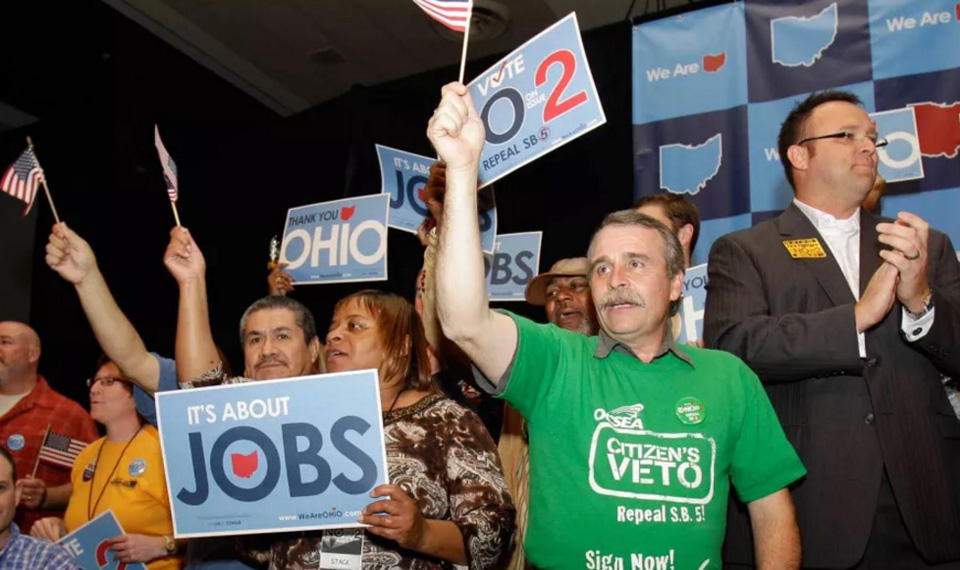
Just days after a major labor mobilization and protest against the GOP proposal to overhaul Ohio’s unemployment compensation law, sponsors have pulled that proposal, HR 620, and opened negotiations with unions on how to correct problems with that system.
Last Tuesday, over 400 Ohio unionists packed the statehouse, lobbying state reps and packing the hearing room to protest the GOP attack on worker’s unemployment benefits. Republicans then floated a replacement bill, which was remarkably similar to the first bill. HR 620 would cut workers’ benefits, make eligibility much more difficult and cut benefit amounts dramatically. Ohio AFL-CIO opposed that bill also and mounted a major campaign to follow up and call, text, contact their reps, urging ‘no’ votes.
Today, it appears that labor’s brief campaign was successful.
Ohio’s unemployment compensation trust fund had been underfunded, and lawmakers expressed concern that the fund would be overwhelmed if the economy took another nosedive.
“The underfunding problem is very real,” said Zach Schiller, from Policy Matters Ohio. “What they are not telling you is that the problem is of their own making. Republicans cut taxes for businesses, cutting the amount going into the trust fund. Now they are trying to ‘fix it,’ on the backs of Ohio’s working families.”
A temporary fix was put in place yesterday by the legislature, when it became clear that senate votes weren’t there to pass HR 620. Meanwhile, GOP leaders have agreed to meet with Ohio AFL-CIO president Tim Burga, other labor leaders, in order to open negotiations on how to craft a real, bipartisan, fix. The temporary replacement agreement will raise taxes on businesses to put money into the system, and will put in place a labor/management, bipartisan, committee to negotiate a comprehensive settlement to this issue.
“This week’s fight showed that they cannot just roll over organized labor and Ohio’s working families,” said Central Ohio Labor Federation President Dave Caldwell. “They got a real wake-up call when all those folks showed up to shake their tree last week. They are literally terrified of another referendum, like the huge fight over SB 5.”
SB 5 was a bill passed by the GOP in 2011 that would have wiped out public employee bargaining. It was reversed when a massive coalition, led by organized labor, put a referendum opposing SB 5 on the ballot. The referendum passed by over 70%, killing SB 5.
This week, everyone appeared to get the message that the unemployment compensation measure was dead whether they liked it or not. Advocates say the main sponsor of HR 620, Lew Blessing (R-Cincinnati), was none too happy.
Norm Wernet, president of the labor-backed Ohio Alliance for Retired Americans (ARA) said he was in a hearing with Blessing when he was informed.
“He was not happy when he was handed the memo,” said Wernet. “After shaking his head, he stood up and announced, ‘HR 620 will not be heard today, and it will not be heard the rest of the week. It is not now scheduled to be heard. For all of you opponents of the bill—Merry Christmas & Happy New Year!’
“He then turned and disappeared out the door!”
Union members, on the other hand, are happy with the outcome.
“HR 620 would’ve taken 83% of their proposed saving from cutting worker’s benefits, when their underfunding it created the problem,” said Matt Smith, Legislative Director, Ohio AFL-CIO. “We showed that ultimately power is in the working people when they are motivated and mobilized!”












Comments